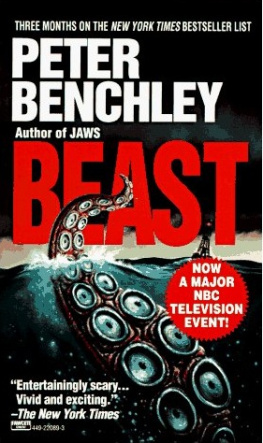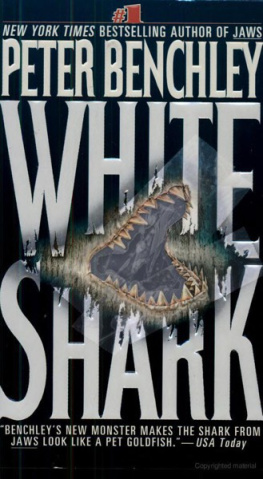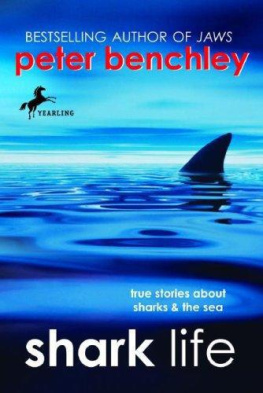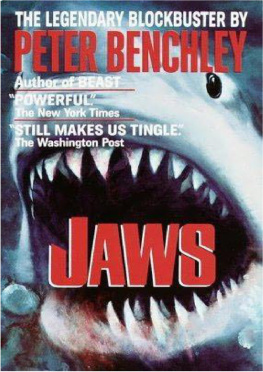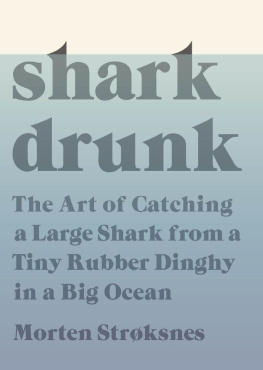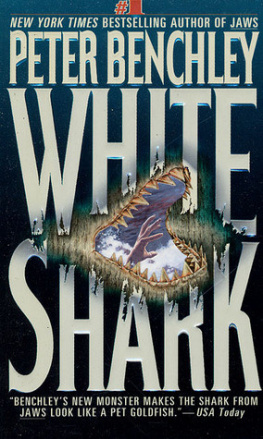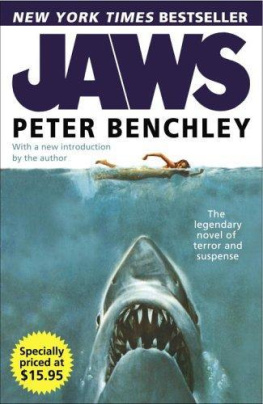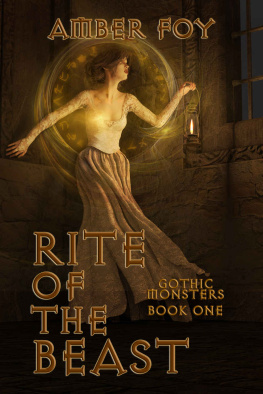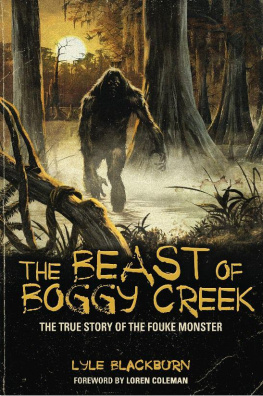Beast
Peter Benchley
Copyright 1991 by Peter Benchley
Library of Congress Catalog Card Number: 91-10579
ISBN 0-449-22089-3
e-book ver. 1.0
For the Squid Squads
1979
Billy Mac, Garbage Bob,
The Duke, Columbus Mould,
Captain Fathom
1990
George Bell, Clayton Benchley.
Nat Benchlev, Adrian Hooper, Kyle Jachney, Stan Waterman, Michele Wernick, Donald Wesson, John Wilcox
And, of course, for the Tuckers: Teddy, Edna and Wendy
She [Scylla] has twelve splay feet and six lank scrawny necks. Each neck bears an obscene head, toothy with three rows of thick-set crowded fangs blackly charged with death . Particularly she battens on humankind, never failing to snatch up a man with each of her heads from every dark-prowed ship that comes.
HOMER, The Odyssey
PART ONE
1
IT HOVERED IN the ink-dark water, waiting.
It was not a fish, had no air bladder to give it buoyancy, but because of the special chemistry of its flesh, it did not sink into the abyss.
It was not a mammal, did not breathe air, so it felt no impulse to move to the surface.
It hovered.
It was not asleep, for it did not know sleep, sleep was not among its natural rhythms. It rested, nourishing itself with oxygen absorbed from the water it pumped through the caverns of its bullet-shaped body.
Its eight sinuous arms floated on the current; its two long tentacles were coiled tightly against its body. When it was threatened or in the frenzy of a kill, the tentacles would spring forward, like tooth-studded whips.
It had but one enemy: All the other creatures in its world were prey.
It had no sense of itself, of its great size or of the fact that its capacity for violence was unknown in other creatures of the deep.
It hung more than half a mile below the surface, far beyond the reach of any sunlight, yet its enormous eyes registered faint glimmers, generated, in terror or excitement, by other, smaller hunters.
Had it been observable to the human eye, the animal would have been seen as purplish maroon, but that was now, at rest. When aroused, it would change color again and again.
The only element of the sea that the animals sensory system monitored constantly was temperature. It was most comfortable in a range between 40 and 55 degrees Fahrenheit, and as it drifted with the currents and encountered thermoclines and upwellings that warmed or cooled the water, it moved up or down.
It sensed a change now. Its drift had brought it to the scarp of an extinct volcano, which rose like a needle from the ocean canyons. The sea swept around the mountain, and cold water was driven upward.
And so, propelled by its tail fins, the beast rose slowly in the darkness.
Unlike many fish, it did not need community; it roamed the sea alone. And so it was unaware that many more of its kind existed than had ever existed before. The balance of nature had been disrupted.
It existed to survive. And to kill.
For, peculiarlyif not uniquelyin the world of living things, it often killed without need, as if Nature, in a fit of perverse malevolence, had programmed it to that end.
2
FROM AFAR, THE boat might have been a grain of rice on a vast field of blue satin. For days, the wind had blown steadily from the southwest. Now, in the past few hours, it had faded withered, retreatedand the stillness was uncertain, as if the wind were catching its breath and shuffling like a weary fighter before deciding where to launch its next assault.
Howard Griffin sat in the cockpit, one bare foot resting on a spoke of the wheel. The boat, deprived of the driving force of the wind, rocked gently in the long swells.
Griffin glanced up at the flapping sails, then checked his watch and cursed himself for a fool. He hadnt counted on this, hadnt anticipated a calm. He had plotted their course, their schedule, on the presumption of southerly winds.
Naive. Stupid. He should have known better than to try to outguess the weather.
They were already hours behind schedule, thanks to having spent the entire morning in the Royal Navy Dockyard waiting for a customs officer to finish showing an apprentice how properly to search a fifty-two-foot Hatteras for contraband.
They should have been well at sea by now. Instead, as Griffin turned and looked back off the fantail, he could see the tall channel marker at the end of Eastern Blue Cut, a white speck glistening in the oblique light of the lowering sun.
He heard the kettle whistling below, and after a moment his wife came up through the hatch and handed him a cup of tea. He smiled his thanks and, as the thought suddenly came into his mind, he said, You look terrific.
Startled, Elizabeth smiled back. Youre not so bad yourself.
Im serious. Six months on a boat, I dont know how you do it.
A delusion. She bent down and kissed the top of his head. Your standards have gone to hell.
Smell good, too. Soap and air and skin. He looked at her legs, the color of oiled oak, not a stretch mark or a varicose vein to betray age or two children born more than fifteen years ago, just a single white scar where she had barked her shin against a concrete post one night down in the Exumas. He looked at her feet, brown and knobby and callused. He loved her feet.
How am I ever gonna wear shoes again? she said. Maybe Ill get a job at the Barefoot Bank and Trust Company.
If we ever get there. He gestured at the luffing mainsail.
The windll go round again.
Maybe. But we dont have time. He leaned forward, toward the ignition key, to turn on the engine.
Dont.
You think I like it? The mans gonna be at the dock Monday morning, and we better be there too.
One second. She held up a hand, staying him. Just let me check.
Griffin shrugged and sat back, and Elizabeth went below. He heard a burst of static as she adjusted the radio, then Elizabeths voice as she spoke into the microphone. Bermuda Harbour Radio, Bermuda Harbour Radio, Bermuda Harbour Radio this is the yacht Severance.
Yacht Severance, Bermuda Harbour Radio came back a voice from fifteen miles to the south. Go to six-eight, please, and stand by.
Severance going to six-eight, Elizabeth said, and there was silence.
Griffin heard a little splash off the stern of the boat. He looked overboard and saw half a dozen gray chubs swarming on a patch of yellow sargasso weed, competing for the tiny shrimps and other creatures that took shelter among the floating stalks and bladders. He liked sargasso weed, as he liked shearwaters, which spoke to him of freedom, and sharks, which spoke to him of order, and dolphins, which spoke to him of God. Sargasso weed spoke to him of life. It traveled on the water, pushed by the wind, bearing food for small animals, which became food for larger animals, and so on up the food chain.
Yacht Severance, Bermuda Harbour Radio go ahead.
Yes, Bermuda. Were sailing north for Connecticut. Wed like to get a weather forecast. Over.
Right, Severance. Barometer three-oh-point-four-seven and steady. Wind southwest ten to fifteen, veering northwest. Seas three to six feet tonight and tomorrow, with winds northwest fifteen to twenty. Scattered showers possible over open water. Over.
Many thanks, Bermuda. Severance standing by on sixteen.
Elizabeth reappeared through the hatch and said, Sorry.
Me too.
This wasnt the way it was supposed to end.
No.
What was supposed to happen, how they had envisioned their return, was that they would ride a south wind all the way up the coast, and when they cleared Montauk Point, with Fishers Island ahead and Stonington Harbor just beyond, theyd run up all the burgees and pennants and flags from all the countries and yacht clubs and marinas theyd visited in the last half-year. When they reached the Stonington breakwater, the wind would back a little bit around to the east so they could march triumphant down the harbor with everything flying proud and beautiful. Their kids would be waiting on the dock with Elizabeths mother and Griffins sister and her kids, and theyd have a bottle of champagne and then strip the boat of all their personal things and turn it over to the broker for sale.
Next page
